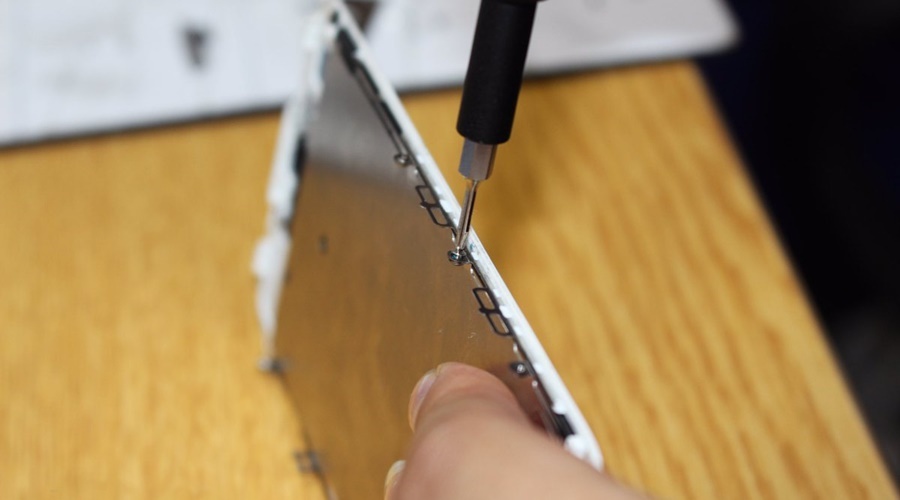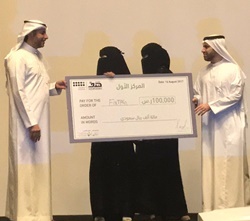This is how 3 Saudi female students launched a mobile repair company

Fixing electronic devices such as phones and laptops is a field dominated by men, especially in the Arab world. However, a group of young Saudi women proved to be capable of penetrating this domain.
When Aljawharah Alqahtani was studying at the Princess Nora bint Abdul Rahman University in Riyadh, she noticed that some people, especially women, would rather throw their mobile devices instead of fixing them, to make sure their personal data is kept private.
So, she decided in 2013, to open a Twitter account through which she offers her colleagues phone and laptop maintenance when needed. A year after, she opened a store on campus for a low rental fee, to maintain and fix mobile devices and to sell accessories.
In 2015, she turned the Twitter account and the store into a startup she called Fixtag. It runs now two stores: one in Princess Nora’s University campus and the other on the Exit 6 road, in addition to an online platform for ordering services and products.
Today, the company has three cofounders: AlJawarah, CTO, her sister Madhawi Alqahtani, COO, and Alanoud Alqahtani, CEO.
The company’s motto is ‘women can fix your phone’. “This moto draws attention to our company, since it’s new to the Saudi community, where men usually fix mobile devices,” Alanoud told Wamda. She added: “Our slogan helps increasing people’s trust in us when it comes to their privacy. They trust women more, given their integrity and excellence in what they do, which requires accuracy and patience,” she added.
When a hobby turns into a business
Fixtag receives approximately 20 orders per day, most of which are walk-in customers, whereas online orders through their website do not exceed 10 percent of the total orders.

Fixtag charges 30 Saudi Riyals (US$ 8) to examine the device. For online orders, the examination costs 65 Riyals (US$ 17, shipping included). The customer can pay through banking transfer or on delivery.
Since its inception, the company has managed to provide maintenance services to around 18,000 customers, according to Aljawharah.
Working in university campuses
The support the university granted Fixtag’s team helped them overcome licensing and regulatory challenges. “To register a company, you need a municipality license that is hard and complicated to get for a startup. Our university helped us get this license since our shop is on its campus,” AlJawharah explained.
Though this helped them launch, “we could not expand to more than the university in the first couple of years because we did not have a license to operate outside it,” said AlAnoud.
“This affected our work negatively: our summer sales were negatively impacted, and we faced difficulties in hiring since only female university students were allowed on campus,” she added.

Despite that, Fixtag is insisting on opening stores in universities campuses, driven by the low rental fees they grant, the help with getting a license, and the combined targeted niche: youth.
“Being within a women community, and in one of the biggest women universities such as Princess Nora Bint Abdul Rahman University, helps us reach our targeted clientele on a faster pace,” explained AlAnoud.
Worth noting that Saudi youth aged under 30 years old constitute over half of the population, and “they spend most of their time at universities, and not in shopping centers. They also prefer buying a new phone, not a broken nor a damaged one,” she added, which boosts Fixtag’s business opportunities.
But Fixtag is also trying to reach a larger market segment outside universities through its platform and the branch on Exit 6.
Hiring is even harder
AlJawarah managed to start her own business, at a time when computer science graduates in Saudi Arabia suffered from unemployment.
When launched, Fixtag’s services were limited to female university students, and AlJawarah fixed the devices on her own.
Currently, Fixtag’s team extends to 13 females and two male employees.
However, the team had to face two difficulties when hiring: the first is hiring people with experience, and the second is hiring women that know how to fix devices.
To solve this problem, the team hired individuals within their circle. “We invited people we know and who believe in our idea, to apply for a job with us,” said AlAnoud.
But how to encourage Saudi women to enter into a male dominated field?
AlJawharah revealed that Fixtag benefitted from social media platforms to overcome the hiring issue: “we used these platforms to showcase our diary and the fun in our work. This attracted women and encouraged them to apply for a job with us”.
“The team focused on fresh graduates in computer science, and provided them with trainings before choosing the right people for the job,” AlAnoud added.
Upcoming projects
Fixtag is planning two additional stores: one is slated for Jeddah, at the King Abdullah University of Science and Technology, and another one in Riyadh, at the King Saud University. Both outlets are expected to open next year.
The cofounders did not disclose Fixtag’s profits. However, the team is using their revenues to open new branches, according to AlAnoud.

While this company debuted its business with just self-funding and a bank loan without any additional financial support, it is currently seeking investments to open new branches and further develop their team
Update: Fixtag team won the first place and 100,000 Saudi Riyal (US$100,000) at 910ths Accelerator Showcase event, held on Wednesday, August 16.


